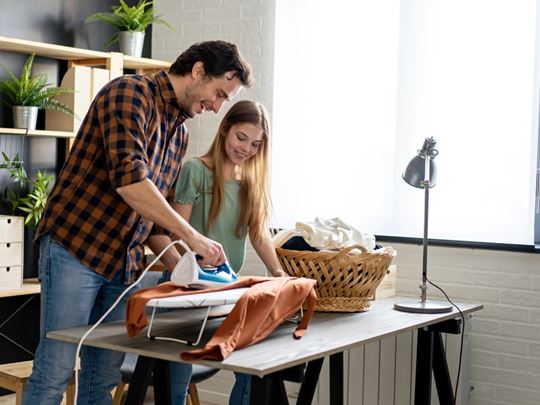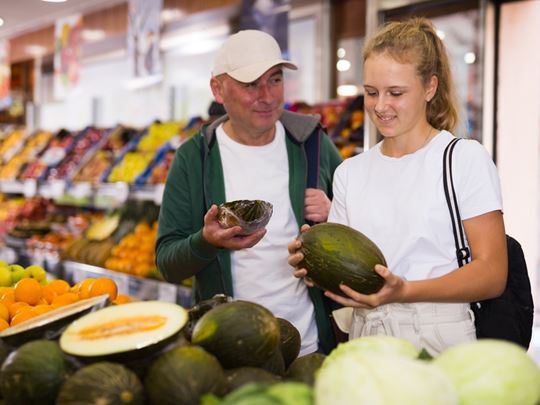Living independently comes with responsibilities you may not have needed to think about before. In this guide, we explore the practical skills you’ll need for independent living, providing tips to help you begin building these skills now.
Why should you start building practical skills now?
When you think about living independently, you may feel excited, nervous or something in between. Planning ahead by building the practical skills you’ll need to manage a home will help you better adapt to the change and feel less overwhelmed when the time comes.

Household chores
Whether you love or loathe them, chores are an unavoidable part of living independently. Housework may already be part of your routine, but the best way to prepare for being responsible for all household chores is to practice doing each one.
Talk to your foster parents about rotating the type of chore you do each day and ask them to walk you through chores you’ve not done before, such as laundry. I am sure they’d be delighted if you offered to do all the housework for a week – this will allow you to see exactly what you’ll be responsible for when you become self-reliant.
When you begin living independently, you can create a chore schedule, allocating time each day to a specific task so you don’t have to spend your whole weekend cleaning. For example, you could dust on Mondays, vacuum on Tuesdays and clean the bathroom on Wednesdays. Some apps can help you stay on top of your housework, too.
Basic Home maintenance
Along with housework, whether you live in social housing, university accommodation, or privately rent, you’ll also be responsible for some household maintenance tasks, including:
- Replacing light bulbs.
- Changing fuses in appliances.
- Ensuring smoke alarms and carbon monoxide detectors work by regularly testing them and replacing batteries when needed.
- Unclogging the toilet and plug holes.
- Keeping outdoor areas maintained, for example, by mowing the lawn.
- Checking the boiler pressure.
- Bleeding radiators.
It’s also worthwhile knowing how to switch the electrical fuse box back on in the event of a power cut and how to turn the gas supply off if you smell gas in your home.
You can start building these skills now by helping your foster family with minor repairs in the home. For example, you could use an old appliance to practice changing a fuse and ask them to show you how to turn the electrical fuse box on.
Safety in the home
When living independently, you’ll be responsible for keeping yourself safe from hazards in the home. You can prepare for this using a notepad, spreadsheet or downloadable template to create a basic risk assessment of your current home.
Walk around each room in your home and identify any potential hazards you see and the harm they could cause. Then, think about what you can do to prevent an accident or injury from occurring.
For example, if you walk into the bathroom, a potential hazard could be a wet floor after a shower, which could cause someone to slip and hurt themselves. You could prevent an injury by using a non-slip bathmat and ensuring people who use the bathroom mop up any water they splash onto the floor.
The most common hazards in the home include:
- Fire – can be caused by overloaded plug sockets, faulty electrical appliances, candles, electric heaters, BBQs, cooking and Christmas tree lights. Check out the government’s guidance on fire safety in the home, which includes preventing fires and planning an escape route.
- Carbon monoxide poisoning – appliances used for heating and cooking, such as boilers, ovens, open fires, gas fires and log burners, can all cause carbon monoxide poisoning. The best way to avoid this is by ensuring your carbon monoxide detectors are working and that appliances, such as the boiler, are regularly serviced by a qualified engineer.
- Mould – may cause respiratory illnesses and make lung conditions worse. You can manage mould in your home by reducing moisture and regularly cleaning affected areas. When you live independently, if mould is caused by structural issues, it’s the landlord’s responsibility to resolve them.
- Injuries – cuts, burns, trips and falls are all common injuries that often occur in the home. The Royal Society for the Prevention of Accidents has excellent resources for home safety, which you can use when living independently.
Cooking and Grocery Shopping
Once you leave home, grocery shopping and cooking for yourself will become an everyday task. You can start preparing by practising your culinary skills and cooking for your foster family. Use every opportunity to get involved by helping your foster family choose recipes for meals or offering to go to the supermarket to do the grocery shopping.
If your family don’t already, you could suggest meal planning. Meal planning and prepping will save you time and money when you live independently and can prevent you from making unhealthy food choices after a long day. Check out BBC Food’s budget recipes and meal plans for ideas.

Budgeting
When you begin living independently, it’ll be your responsibility to pay the bills and buy essential items such as food, clothing and toiletries. You may also have long-term goals like buying your own home that can only be achieved if you manage your money well. Check out our budgeting basics blog for hints and tips to get started.
Self-care
Learning to look after yourself is a skill that will help you throughout life. When you first leave home, it can be easy to pick up unhealthy habits, which can lead to health problems and affect both your work and home life. You can take conscious steps now to look after your health, such as:
- Eating well by learning to cook nutritious meals.
- Drinking plenty of water.
- Avoiding activities that are harmful to your health, such as smoking, vaping and drinking alcohol.
- Staying active by finding an exercise you enjoy.
- Getting fresh air and spending time in nature.
- Meeting up with friends, and family.
- Ensuring you make time for the things you love.
- Finding healthy ways to manage stress, like mindfulness.
- Knowing when to see a doctor.
- Knowing when to ask for help.
Whether you’re leaving home in a few months, a year or longer, preparing in advance for adulthood will make the transition smoother and more enjoyable. So, why not start building your practical skills today?
Need a little help or advice?
Handbooks & Guides?
Are handy handbooks are designed with you in mind, full of helpful information for both you and your foster family.
Independents
Are you about to be independent or have you already left? Find support and information here and remember to stay in touch.
Have your say
We are here for you, have your say on topics you want to read, give us your feedback or contribute to your foster parent’s review.
Kids of Carers
We offer help and support to birth children and young people whose parents are foster carers.





